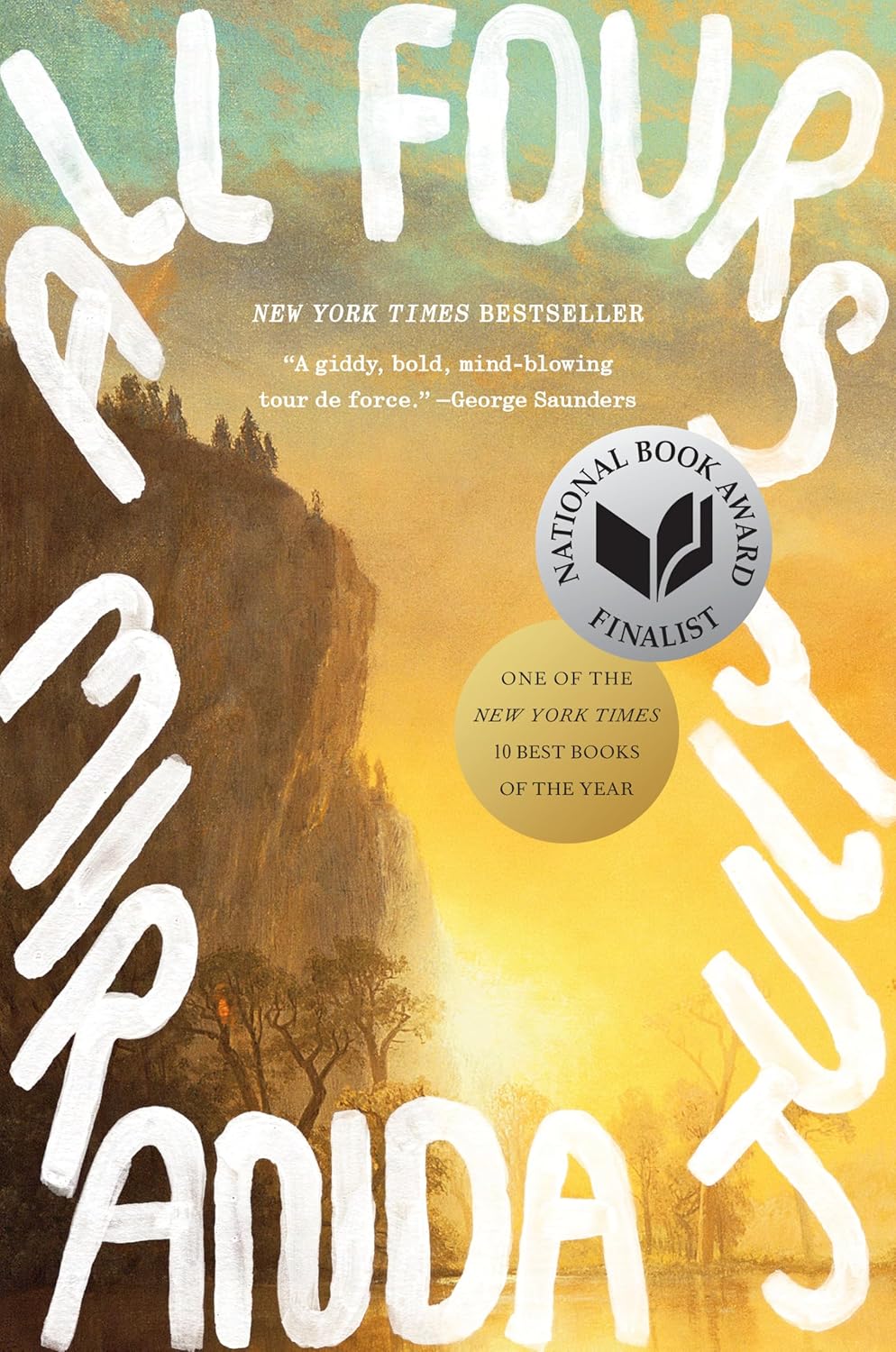
All Fours
Chapter 27
by July;, MirandaThe chapter opens with the narrator flying to Oakland to visit Kris, reminiscing about a playful game they used to play with their toddler, Sam. This memory sparks an idea: could they recreate a similar dynamic with Kris, using role-play to explore emotional vulnerability? The narrator imagines a scenario where Kris confesses to a fictional affair, allowing them to enact a dramatic reconciliation. This fantasy highlights the narrator’s desire for intense emotional connection and their confidence in Kris’s willingness to engage in such games.
Upon arrival, the narrator notices Kris’s unusual mood, marked by detachment and avoidance. Their usual rituals, like grocery shopping, feel strained, and Kris’s indifference to treats or eye contact signals deeper unrest. The tension escalates when Kris admits feeling hopeless about their compatibility, citing a trivial incident involving lipstick as emblematic of larger issues. The narrator is baffled, dismissing the concern as irrational, but Kris’s silence and avoidance suggest a more serious rift.
The situation reaches a breaking point when Kris suggests taking time apart, leaving the narrator stunned and desperate. In a dramatic gesture, the narrator removes a symbolic ring and storms out, hoping Kris will chase after them. When this doesn’t happen, they return to Kris’s cottage, only to be met with cold indifference. Kris’s showered and changed appearance, along with her readiness to go out, underscores the finality of the moment, leaving the narrator reeling.
The next morning, the narrator attempts to reconcile, texting Kris with apologies and a request to reunite. Kris agrees but warns she may not be able to talk, which the narrator interprets as a positive sign. However, Kris’s subsequent text—revealing she had sex with Elsa, the very role-play character the narrator had imagined—shatters any hope of reconciliation. The chapter ends with the narrator in shock, the reality of the breakup sinking in amidst the cruel irony of their earlier fantasy.
FAQs
1. How does the narrator’s memory of playing “I’m back!” with Sam contrast with their current relationship dynamics with Kris?
Answer:
The childhood game with Sam represents a secure, playful dynamic where separation was temporary and reconciliation was guaranteed with dramatic affection. In contrast, the narrator’s relationship with Kris shows instability and uncertainty—while they fantasize about recreating this game through roleplay (“confessing” a liaison with Elsa), the reality is that Kris’s emotional distance and eventual breakup threat create genuine distress. The memory highlights what the narrator craves (security and playful intimacy) versus what they’re experiencing (real relationship anxiety and potential abandonment).2. Analyze the significance of the gold buckle ring scene. What does this moment reveal about both characters?
Answer:
When the narrator removes and drops the ring, it’s a performative act of desperation, hoping Kris will intervene to stop the breakup. Kris’s passive reaction (just watching) confirms her emotional detachment, revealing she’s already emotionally checked out. The narrator’s dramatic gesture contrasts with Kris’s calmness, underscoring their mismatched coping mechanisms: the narrator seeks intense reconciliation, while Kris withdraws. The ring symbolizes their connection, and its abandonment mirrors the relationship’s collapse.3. How does the narrator’s texting strategy (“proving” calmness by waiting until 10 a.m.) reflect their emotional conflict post-breakup?
Answer:
The delayed text attempts to project stability (“I regret being reactionary”) while masking the narrator’s turmoil (sleeplessness, incoherence at Sharon’s). This contradiction reveals their denial—they believe suppressing emotions will fix things, ignoring Kris’s clear disinterest (“I might not be able to talk”). The strategy backfires when Kris’s confession about Elsa shatters the narrator’s fantasy of silent reconciliation, exposing their avoidance of the relationship’s real issues.4. Why might Kris’s comparison of the narrator to her mother (“My mom was like that”) be particularly damaging to their relationship?
Answer:
Kris’s comment frames the narrator’s behavior (rejecting a kiss over lipstick) as reminiscent of her mother’s emotional withholding, implying deeper incompatibility. This comparison personalizes the conflict, suggesting the narrator triggers childhood wounds rather than being a safe partner. The narrator’s attempt to fix it (“I love kissing you!”) fails because Kris isn’t critiquing a single action but a perceived pattern tied to familial dysfunction, making resolution nearly impossible.5. Evaluate the irony in Kris’s confession about Elsa. How does it intersect with the narrator’s earlier fantasies?
Answer:
The narrator had fantasized about roleplaying Kris’s “confession” as Elsa to simulate jealousy and reconciliation (“the void had been touched”). The reality—Kris actually slept with Elsa and coldly reveals it—twists this fantasy into tragedy. The irony lies in the narrator’s desire to control the narrative (playful, safe) versus the uncontrollable pain of the real betrayal, highlighting the gap between their imaginative coping mechanisms and harsh reality.
Quotes
1. “Could I play this game with Kris? Could I have sex with her as Elsa Penbrook-Gibbard, like last time, then become myself again so Kris could ‘confess her liaison’?”
This quote captures the protagonist’s complex psychological game of roleplay and emotional manipulation, revealing the depth of their relational dynamics and the blurred lines between identity, performance, and intimacy.
2. “She hung her head and after a long time she said, I feel hopeless about us. We’re not compatible.”
A pivotal moment in the chapter where Kris expresses her emotional withdrawal, marking the turning point in their relationship and setting the stage for the protagonist’s unraveling.
3. “I jumped up like lightning, grabbed my purse, pulled up the handle on my wheelie bag—click-click. My ears were popping; my brain and muscles were flooded with thin fluid.”
This visceral description illustrates the protagonist’s panicked reaction to rejection, showcasing their emotional fragility and the physical manifestation of their distress.
4. “Before you come over I should mention I had sex with Elsa.”
The shocking final message that brings the protagonist’s earlier fantasy full circle in the cruelest possible way, demonstrating how reality can mirror and distort our imagined scenarios.
